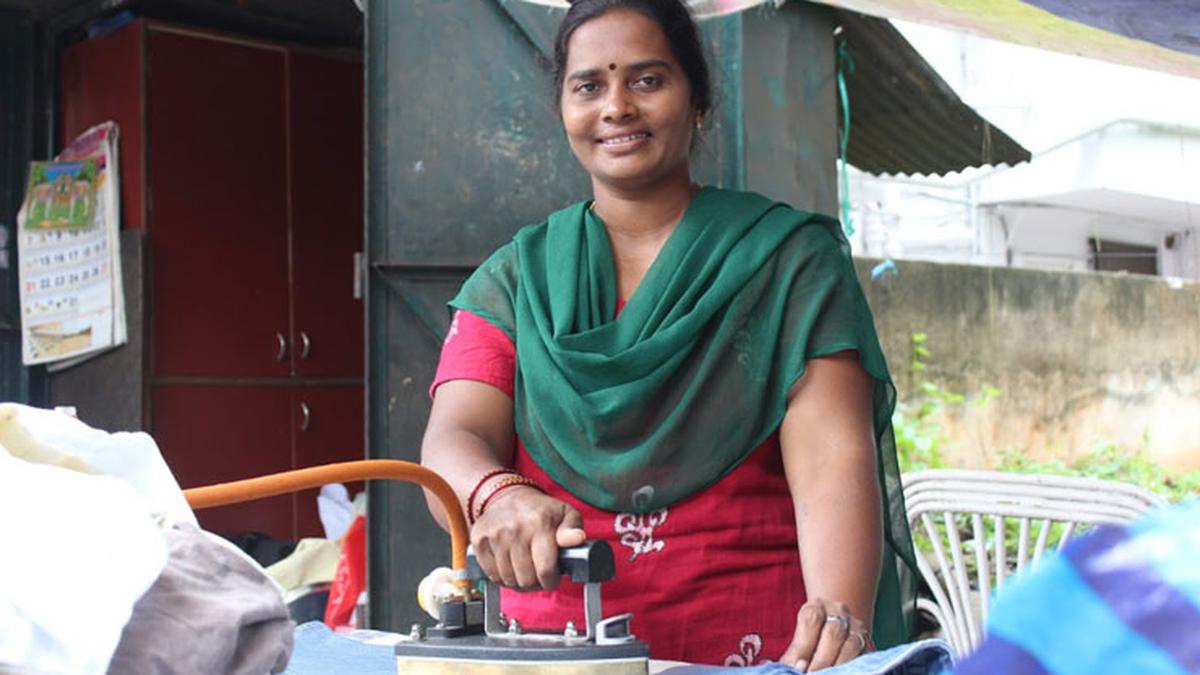
An LPG switch to iron out Istriwalas’ woes Premium
The Hindu
Charles and his ironing cart are stationed in an upmarket residential area near Halasuru. A few clothes have been neatly ironed, folded and stacked near a corner of the cart. A customer stops by to enquire about her clothes, he guarantees delivery by the next morning.
Charles and his ironing cart are stationed in an upmarket residential area near Halasuru. A few clothes have been neatly ironed, folded and stacked near a corner of the cart. A customer stops by to enquire about her clothes, he guarantees delivery by the next morning.
“Earlier I used a coal iron box which at times led to trouble. The ember would fall on expensive clothes and create holes in them, and the customer would be infuriated. There have been instances of customers threatening to go to cops if I don’t pay the full price of the damaged garment,” he says.
A few months back Mr. Charles switched to an LPG iron box, and things have changed for the good since then for him. It’s cost-effective, convenient and gives a better finish to ironed clothes, so much so that customers are now asking for clothes pressed by LPG iron box, he says. His earnings have improved from around ₹20,000 earlier to more than ₹30,000 a month now.
“If I could iron 100 clothes using a coal iron box in a day, the LPG box allows me to do 150. It’s also less cumbersome. The heat can be controlled, the instrument can be switched off if I must move away from the cart and it doesn’t produce smoke and leave stains on my hand unlike a coal iron box,” he says.
Mr. Charles is one of the many ironing vendors of Bengaluru who switched from coal ironing boxes to LPG ironing boxes in the last few years as part of a campaign called Istri Project by Bengaluru based non-profit Udhyam Foundation.
According to the NGO, across Bengaluru and Chennai, the campaign has successfully converted more than 5,300 ironing vendors from using coal iron boxes to LPG boxes resulting in an average 25% increase in revenue for the vendors.
Udhyam Foundation was founded by Mekin Maheshwari, former CPO at Flipkart, in 2017. Krishnan Ranganathan, who joined the same year as cofounder, notes that the organisation was conceived with the idea of finding solutions to the large unemployment problem in the country.

Hampi, the UNESCO-recognised historical site, was the capital of the Vijayanagara empire from 1336 to 1565. Foreign travellers from Persia, Europe and other parts of the world have chronicled the wealth of the place and the unique cultural mores of this kingdom built on the banks of the Tungabhadra river. There are fine descriptions to be found of its temples, farms, markets and trading links, remnants of which one can see in the ruins now. The Literature, architecture of this era continue inspire awe.

Unfurling the zine handed to us at the start of the walk, we use brightly-coloured markers to draw squiggly cables across the page, starting from a sepia-toned vintage photograph of the telegraph office. Iz, who goes by the pronouns they/them, explains, “This building is still standing, though it shut down in 2013,” they say, pointing out that telegraphy, which started in Bengaluru in 1854, was an instrument of colonial power and control. “The British colonised lands via telegraph cables, something known as the All Red Line.”

The festival in Bengaluru is happening at various locations, including ATREE in Jakkur, Bangalore Creative Circus in Yeshwantpur, Courtyard Koota in Kengeri, and Medai the Stage in Koramangala. The festival will also take place in various cities across Karnataka including Tumakuru, Ramanagara, Mandya, Kolar, Chikkaballapura, Hassan, Chitradurga, Davangere, Chamarajanagar and Mysuru.








